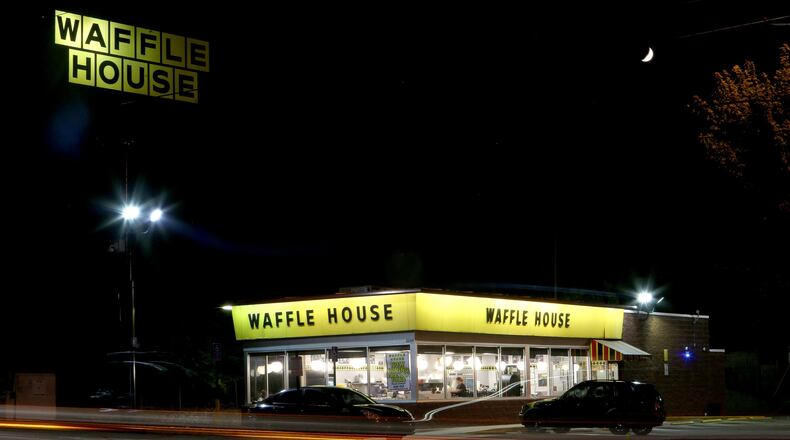The chairman of Waffle House, a chain known for getting its restaurants back up and running after natural disasters, is worried that many political leaders are headed down the wrong path as they battle the coronavirus outbreak.
Recent mandates, such as banning in-restaurant dining and closing some businesses, are “totally out of proportion,” said Joe Rogers Jr., the 73-year-old sole board member of the nearly 2,000 restaurant chain based in Norcross.
“American leaders have to lead people through ruinous times, but leaders don’t lead people to ruin,” he said later, warning that many large and small businesses might not survive.
Rogers has urged elected officials in Georgia to not adopt tough restrictions similar to those imposed on businesses in other states. His remarks came before a Thursday announcement by Atlanta Mayor Keisha Lance Bottoms that she had signed an executive order temporarily barring in-restaurant dining and closing down nightclubs, gyms, movie theaters, live music venues and bowling alleys in the city.
Brookhaven, Clarkston and Dunwoody also temporarily halted in-restaurant dining.
Rogers’ stance underlines the competing pressures government leaders face as they attempt to curb the severity of a pandemic that has shaken public health officials and is still not fully understood.
In an interview with The Atlanta Journal-Constitution, Rogers also bemoaned “doom and gloom” talk from the White House. “Any leader in the world that was dealt this hand might not have played it any better,” Rogers said of the president, “but we have to play it better going forward.”
Federal, state and local political leaders “are trying to do the right thing,” he said.
The Waffle House chairman said Georgia Gov. Brian Kemphas shown appropriate restraint.
The governor has asked people to remain home as much as possible and avoid public gatherings. But Kemp hasn't ordered statewide shutdowns of businesses and events, saying in an interview with radio station Q99.7, "I don't know that our citizens would buy into that."
Many local restaurants closed in recent days, plenty without being ordered to do so. That included two of the six metro Atlanta restaurants owned by Indigo Road Hospitality Group.
“I love my employees, and I want them to work,” said Steve Palmer, the group’s managing partner.
But he said he now backs the idea of immediate requirements to close gathering spots nationwide: “If we don’t do this now, we are just prolonging our recovery.”
Waffle House’s Rogers has instead suggested that businesses could be required to show they are creating social distancing. How they do it, he said, should be left up to them.
“If you go further than that and shut businesses down, you are going to wreck this economy,” he said. “And the people who pay for it the most are the people who are the ones who are most vulnerable in our society, and that’s a shame.”
Public health officials have urged people to avoid large gatherings and to keep at least six feet of distance from others in an effort to slow down the spread of the coronavirus. They’ve also advised that people avoid those who are sick, wash their hands often, cover coughs and sneezes, and sanitize surfaces. Without aggressive tactics, they say, the number of COVID-19 cases will continue to surge, potentially overwhelming hospitals in some areas.
President Donald Trump recently recommended that gatherings be limited to 10 people, but it wasn’t a mandate.
Earlier this week, CNN asked Anthony Fauci, the director of the National Institute of Allergy and Infectious Disease, whether he would like to see a national lockdown of restaurants. He replied, “I would like to see a dramatic diminution of the personal interaction that we see in restaurants and in bars. Whatever it takes to do that, that’s what I’d like to see.”
A Waffle House cook was among the earliest confirmed COVID-19 cases in Georgia. He said he returned to work at the same Waffle House location in Canton on Wednesday, when the restaurant reopened. State officials told him he had been asymptomatic for long enough to be allowed to leave quarantine at Hard Labor Creek State Park.
Waffle House has built a reputation for having its normally 24-hour restaurants reopen quickly after devastating storms. A previous Federal Emergency Management Agency administrator referred to a "Waffle House Index" that gauged damage in an area based on whether the chain's restaurants were open and fully operational.
Waffle House, which operates in 25 states, saw sales drop 25% last week, Rogers said. Now, as more states limit restaurants to drive through or to-go business, sales in some areas have fallen 60%. He said the chain will survive, though “we are going to lose money like crazy in this.”
The important thing, he said, is to remain open and keep pay flowing to the chain’s 40,000 workers, most of whom are hourly employees. If Waffle Houses are forced to close across broad areas, the company wouldn’t continue to pay employees who don’t work, Rogers said.
The company has increased sanitization efforts. It also is encouraging social distancing though “we haven’t taken out a tape measure,” he said. “We have let everybody eyeball their own reality.”
Waffle House doesn't have the flexibility of some other chains, particularly fast food restaurants, such as Atlanta-based Chick-fil-A. Some of those already generate most of their sales via drive throughs. Waffle House has just one drive-through, near Stone Mountain.
— Staff writer Jeremy Redmon contributed to this article.
About the Author
The Latest
Featured



